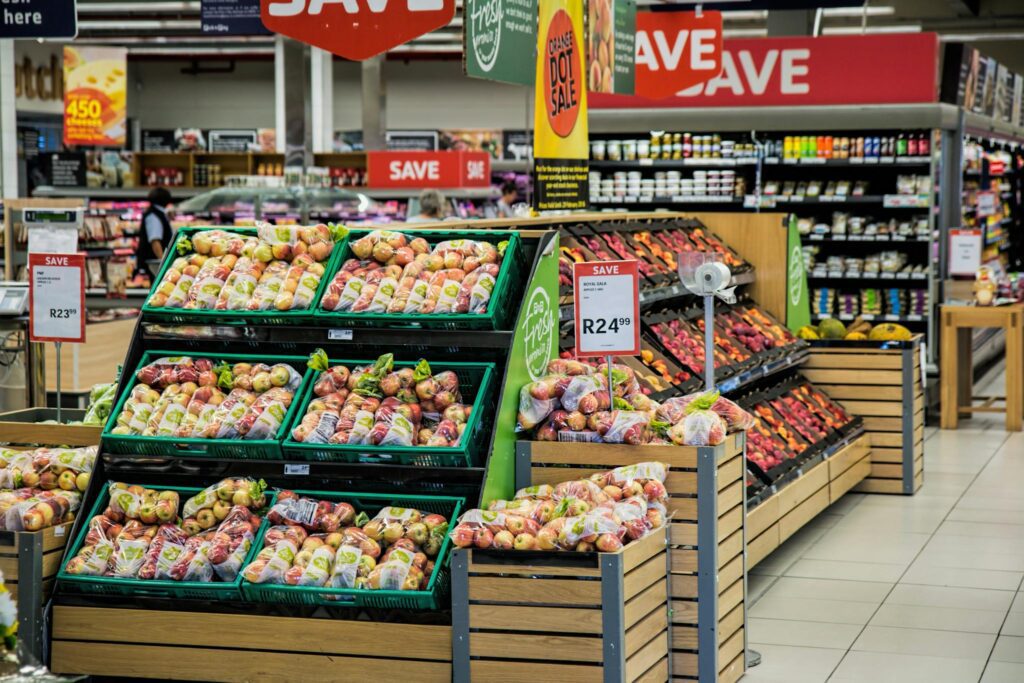Ways to Save Money on Food in College
Without a doubt, food is a necessary expense. However, eating out can be expensive, especially for college students. If you’re no longer using your university meal plan and have to fend for yourself, food can be one of the biggest expenses you have.

If you’re looking for ways to save money on food while in college, this article has you covered. It’ll provide you with tips and advice on how to save money on food without compromising on nutrition or taste. So get ready to learn how to make your food budget stretch and enjoy delicious college meals at the same time!
How much do college students spend on groceries?
The USDA (United States Department of Agriculture) categorizes at home food spending into 4 sections: thrifty budget, low-cost, moderate-cost, and liberal spending. These plans equate to data showing that college age people spend anywhere from ~$250-$450 in food spending each month. This doesn’t include eating out at restaurants or getting takeout.

There’s a wide range of food habits for college students. There will be students that eat at home for every meal, ones that grab food from the on-campus restaurants between classes, students who need a coffee each morning to start their day, and even students who order out multiple times a week.
None of these habits are necessarily bad, but how you decided to allocate your food spending in college can make a difference in overall spending. For kitchen essentials to help you on your eating at home journey, read this post.
What should college students budget for food?
Based on the USDA data it’s safe to say that if your spending around $250 a month on groceries you’re doing well at maintaining a budget.
Unless you really cannot afford to spend above that, it’s important to remember not to prohibit yourself from spending more than that on things like eating out with friends or buying yourself a coffee now and again. You’ll just need to give yourself an additional “eating out” budget if you think you’ll need the restrictions to help keep your money on track.
A good rule of thumb could be to not exceed the liberal spending USDA metric in groceries and eating out combined. That would give about ~$50/week to spend on eating out.
However, budgets are personal and you should spend some time thinking about what’s realistic for you based on your spending history and financial goals.
What are ways I can save money on food in college?
Saving money on food in college is definitely possible, but it is challenging because eating is a necessity.
If you want to spend less money eating out and save money on food while in college, your best bet is to try and eat more meals at home OR better plan your meals so that you’re only buying what you really need. Need help? Keep reading:
How to meal prep/plan
The key to meal prepping is to have a plan. This starts with an idea of what foods you like, what your schedule is for the week, and how you can leverage your cravings to limit the amount of food waste you’ll create. Having a plan for what you’ll eat keeps you from overspending on items that will go bad and it helps keep you from underspending on things you’ll need to have balance meals at home. There are even online resources that can help you figure out what to make with ingredients you alreayd have in your pantry like this one.

Will you be able to eat every meal at home? Are you usually hungry on your commute between classes? Can I eat this meal more than once this week without getting sick of it?
These are all important questions that will form the basis of your meal planning for the week.
A good place to start is with thinking of a meal or two that you’d eat for each meal of the day plus one snack. An example would be:
Breakfast: Bagel and fruit
Lunch: Ham sandwich and granola bar
Snack: granola bar or fruit
Dinner: Chicken, rice, and vegetable
Your meal plan can be more in-depth than this, but overall I recommend choosing 1-2 meats and at least 1 fruit and 1 vegetable.
With a plan in mind, shopping for groceries will be much easier and less overwhelming.
How to make a grocery list
Now that you have your meals planned, it’s time to list all of the ingredients you’ll need to prep those meals. Making a grocery list is just that simple.
Go through each meal that you’ve planned for the week and write out what you need for that meal. With practice you’ll know how many servings you can make with each food item you buy. This will make shopping even easier and limit the amount of food that goes bad before you have a chance to eat it.
To save money, stick to your list! The whole point of planning meals is to keep you from spending unnecessary money once you get to the store. If you didn’t want it while you were at home considering your cravings, you’ll survive without it.
It’s okay to pick up one or two random things, but you shouldn’t be wandering down each isle browsing the different options.
How often should I grocery shop?
This is entirely up to preference and based on what items you typically purchase on a grocery run. Fruits and vegetables have a much shorter shelf life than pasta and cereal. If you’re getting more fresh ingredients you may need to go to the grocery store weekly.
It’s also important to consider how many people you’re cooking for. If you are only buying food for yourself, you’ll need to be good at planning what you want to eat and only getting the food you can make before it goes bad, or ingredients that can be preserved through freezing.
Meal Prepping
Now that the groceries are secured, you’re ready to begin prepping for the week. Start by making any meals you plan to eat on the go. This can be sandwiches, wraps, or snacks. Making these ahead of time and placing them in the fridge will give you less of a reason to eat out when you’re on the go, and it makes sure you’ll actually use the food you just bought.
This is also a good time to separate out food items like poultry into single serving sizes. Once the meat is distributed, you can freeze anything that you won’t eat within the next few days to prolong the amount of time you have before the meat goes bad.
Meal prepping is the best thing you can do for your future self when it comes to cooking. Spending a little extra time one day a week setting your meals up will make cooking throughout the week much less of a hassle. The less stressful cooking becomes, the more likely you’ll continue to cook at home and save money doing so.
It is important to budget carefully to save money on food in college, as food costs can add up quickly. Eating out too often can lead to financial strain, so if you want to save money on college meals, it’s best to plan ahead and choose affordable options to stay within your budget.






